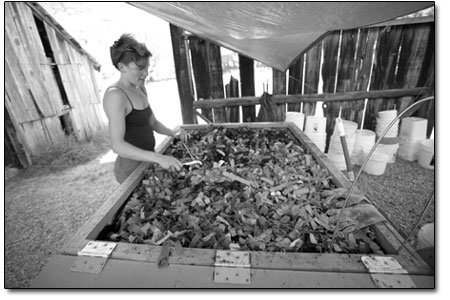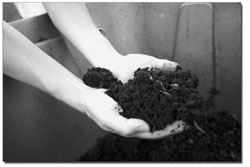|
| ||||
| A big can of worms
by Missy Votel When Jennifer Craig picked up a new hobby more than 10 years ago, she opened a real can of worms. Or in this case, a 36-square-foot wooden box full of the red wrigglers. Craig had been introduced to the idea of worm farming, more formally known as vermiculture, through a past job and decided it would be a fine way to use kitchen scraps while helping the environment. She dabbled in her newfound hobby on and off, until she stumbled on pay dirt three years ago. A friend built her a souped-up, triple decker compost bin, known as a “flow through” system, and she found herself up to her ears in castings (also known in more unsophisticated terms as worm poop.) “I had hundreds of pounds of worm castings, I had so much that I didn’t know what to do with it all,” Craig remembered. “I decided to sell it at the Farmers Market.” While to the squeamish, the idea of worm poop may seem downright offensive, to gardeners and farmers it is the equivalent of black gold. Compost tilled by worms is considered highly superior to typical compost, offering more readily available nutrients , natural growth hormones and billions of beneficial, soil-building microorganisms. And that is where the idea for the Durango Compost Co. was born. while hawking her compost at the market, Craig met up with Tim Wheeler, owner of the Durango Coffee Co. Wheeler, a fixture on the local sustainability scene, was looking for a way to use coffee grounds and other miscellaneous food scraps from his Main Avenue business. “For a long time, I had wanted to find a way to use waste from the shop and also make value out of coffee grounds, food waste, etc.,” Wheeler said. The two struck up a deal, Wheeler would pay Craig to take his grounds off his hands. In exchange, he would get a cut of the profits from the final garden-ready product. Unlike traditional composting, which an be done outdoors in all weather, worm composting requires moderate temperatures for the worms to thrive and, well, do their duty. So, for the first eight or nine months, the worms were kept in a rented basement next to the Coffee Co. The results from the first go were promising until the fire of February 2008 claimed the basement wormatorium. The operation them moved temporarily into an employee’s house until Wheeler and Craig could come up with a plan. “We decided to form a company, so she could make a business out of it and I would have a use for my coffee grounds,” he said. Craig now operates out of her “worm office,” a barn on the Twin Buttes property.
Currently, Craig and Wheeler are working on “perfecting the process” but said the company offers three main services: household composters and worms; public education; and commercial use and consulting. The Composting Co.’s most visible presence is at the Farmers Market, where Craig sells 35-gallon buckets of compost for $35; “compost tea,” a compost-steeped liquid used as fertilizer and to prevent plant disease; and the “Can-O-Worms” home worm composters. In addition, Craig also gives presentations at local schools and works with businesses, such as Ska Brewing and Cyprus Café, interested in worm composting. Since setting up shop under the Compost Co. banner last summer at the Farmers Market, Craig said public interest has been strong. “People are very interested,” she said. While most hard-core gardeners don’t flinch at the cost of a bucket of the high-grade stuff, many are uneducated on the whole vermiculture concept. “A lot of what I do is talk to people about what it is and why it’s so special,” she said According to the U.S. Composting Council, more than 70 percent of waste sent to landfills is carbon-based. Food waste and yard waste, much of which can be composted, each account for about 12 percent of the waste stream. On the flip side, Craig notes, composting not only alleviates this problem, but is easy, inexpensive and produces something valuable in the process. “I really think if everyone does a little, it will reduce the waste going into the landfill by a lot, and it’s really pretty easy,” she said. For starters, Craig said the Can-O-Worms can fit in a basement, kitchen, laundry room or heated garage. The kit comes complete with instructions, a how-to book Worms Ate My Garbage and your very own starter worms. Despite common misconceptions, worm composters do not smell (a healthy one should smell like a “lush rainforest” according to one manufacturer’s website) and are virtually maintenance free once established. A smaller, three-layer composter can handle a typical family’s kitchen scraps, and then some. Worms eat up to their own weight in food every day, although they also rely on shredded paper for energy. When it comes to procreating, they make rabbits look like slackers, doubling their population every month. Although the typical household composter can hold up to 10,000 worms and consume as much as five pounds of waste a day, worms have their own built-in overpopulation regulator. “They’ll keep populating only within food and space constraints,” Craig said. The typical worm farmer can expect to “harvest” results within three months, although Craig said her first attempt netted results in only two. And while there are definite short-term benefits to vermiculture, Craig said it’s the long-term ones that are most important. In addition to the Compost Co., Craig is also on the Forest, Waste and Agriculture Committee for the City’s new Climate and Energy Action Plan. Among other things, the committee is exploring the possibility of curbside compost pick-up, such as is done in San Francisco and Boulder. Although a municipal compost facility would be complex and expensive, the idea is not without merit, said City Resource Conservation Manager Nancy Andrews. “We’re in the real early stages of the planning process, but it’s on the list,” said Andrews, also a member of the committee. “We anticipate compost will be a pretty important part of the Climate Plan and something we will definitely be recommending.” Not only can industrial facilities operate at a higher temperature, thus providing bigger and faster results, but they can compost many of those pesky things that seem to linger forever in home composters, like citrus peels, corn husks and corn-based cups and plates. Now is the time, however, to begin talking, she said, as the city embarks on planning a new Recycling Center. “As we look to build a new recycling center, we are looking at the possibility of composting,” Andrews said. “You can divert a huge amount of materials from the landfill, from yard waste to paper products and food scraps. It really is one of the easiest things we can do to fight greenhouse gas emissions and reduce waste collection.” • The City of Durango will be holding a public meeting on the future of the new Recycling Center at 5:30 p.m. Thurs., July 23, location TBD. Stay tuned to the Telegraph or www.durangogov.org for details.
|
In this week's issue...
- December 18, 2025
- Let it snow
Although ski areas across the West have taken a hit, there’s still hope
- December 18, 2025
- Look, but don't take
Lessons in pottery theft – and remorse – from SW Colorado
- December 11, 2025
- Big plans
Whole Foods, 270 apartments could be coming to Durango Mall parcel



